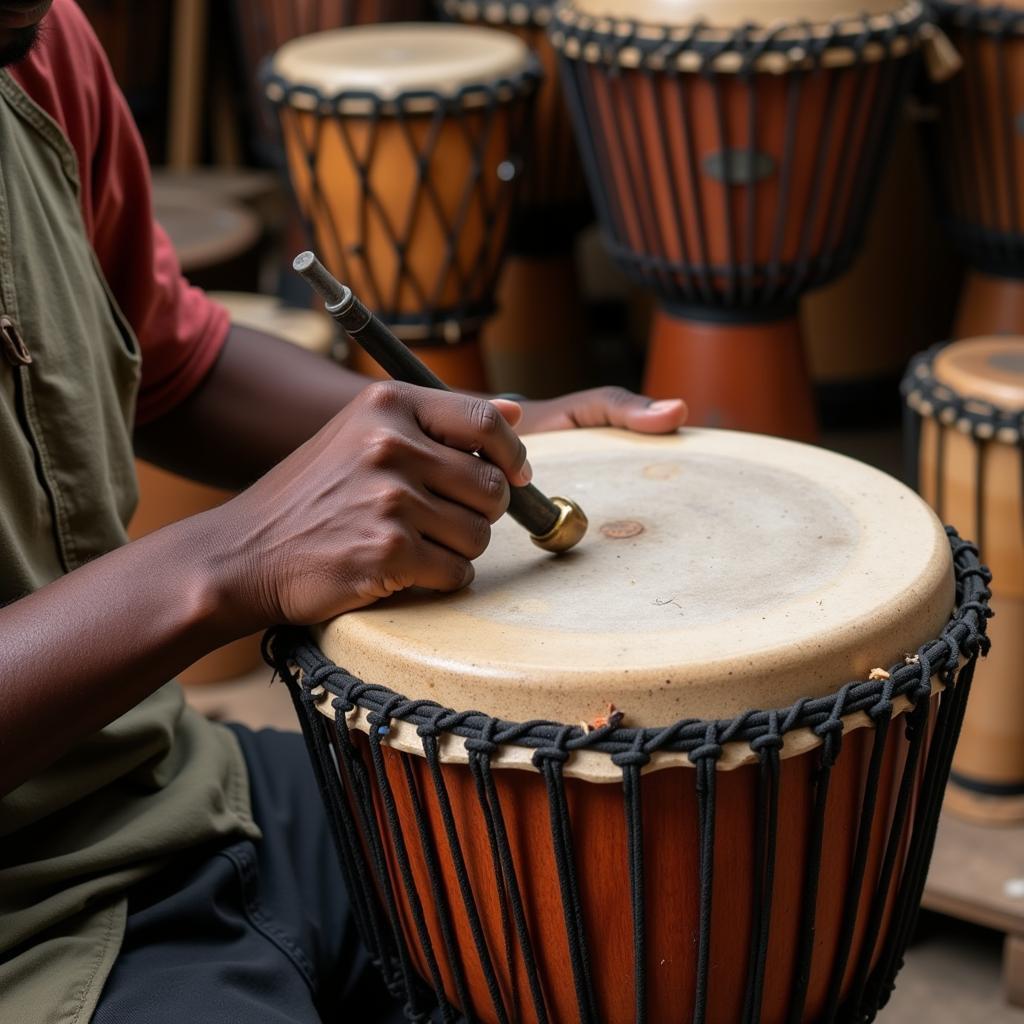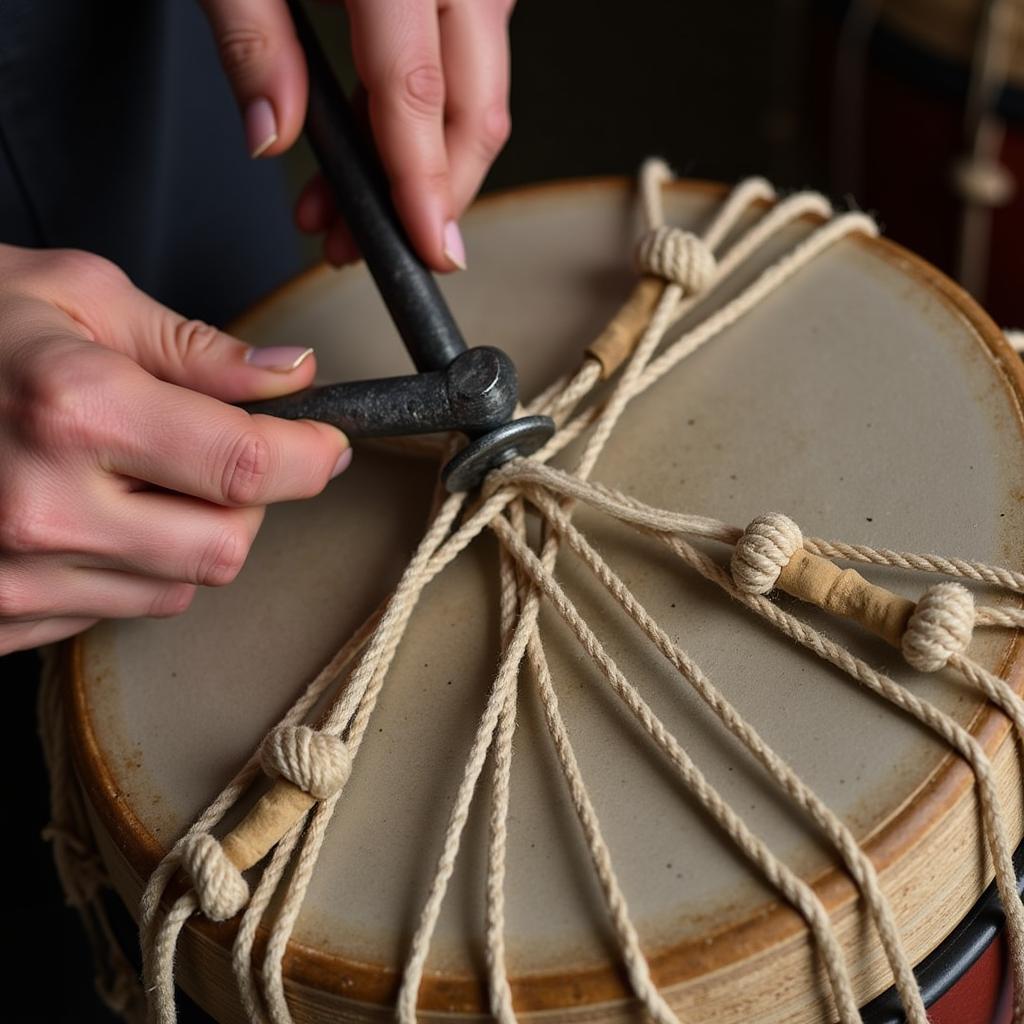African Drum Repairs Australia: Your Guide to Finding Expert Care
Finding quality African drum repairs in Australia can be a challenge. Whether you’re a seasoned musician or a beginner, your djembe, talking drum, or other African percussion instrument is a valuable possession. Knowing where to turn for reliable repairs and maintenance is essential for preserving its sound and extending its life.
Where to Find African Drum Repairs in Australia
Australia boasts a vibrant multicultural scene, with a growing community of African drum enthusiasts. This demand has led to the emergence of skilled artisans specializing in African drum repairs. Your search for a qualified repairer can start online through directories specializing in musical instrument repairs, forums for drummers, and social media groups dedicated to African music. Alternatively, contacting local music stores, especially those with a focus on world music or percussion, can often provide valuable leads. Word-of-mouth recommendations from fellow drummers or teachers are also invaluable.
Common African Drum Repairs
The most common repairs for African drums involve addressing issues with the skin (typically goat or cowhide), the rope tensioning system, and the wooden body. Skin replacements are a common occurrence due to wear and tear, accidental punctures, or changes in climate affecting the hide. Rope replacements are also frequent as the ropes can fray or break over time. Cracks or damage to the wooden shell can occur from impact or changes in humidity.
 African Drum Skin Replacement in Australia
African Drum Skin Replacement in Australia
Choosing the Right Repairer
When selecting a repairer for your African drum, experience and expertise are key factors to consider. Look for a repairer who specializes in African drums specifically, as they will have a deep understanding of the unique construction and materials used. Inquire about their experience with different drum types, such as djembes, dununs, and talking drums. Asking about the types of materials they use for repairs is also important. A reputable repairer will use high-quality, ethically sourced hides and ropes.
Maintaining Your African Drum
Proper maintenance can significantly extend the lifespan of your drum and minimize the need for repairs. Keep your drum in a stable environment, avoiding extreme temperatures and humidity fluctuations. Protect the drum from direct sunlight and moisture. Regularly inspect the ropes for wear and tear and gently wipe the drum’s body with a soft cloth after each use.
 African Drum Rope Tensioning Repair in Australia
African Drum Rope Tensioning Repair in Australia
Understanding Different Drum Types and Their Needs
Different types of African drums have varying maintenance needs. Djembes, with their single head and rope tensioning system, require regular rope adjustments and careful monitoring of skin tension. Dununs, being larger and often played with sticks, may experience more wear on the skin and require more frequent replacements. Talking drums, with their complex mechanisms, need specialized care and adjustments.
Beyond Repairs: Appreciating the Craft
African drums are more than just instruments; they are cultural artifacts that represent a rich history and tradition. Repairing and maintaining these drums is an act of preserving this heritage.
“A well-maintained drum speaks not only through its sound but also through its history,” says Kwame Nkruma, a renowned Ghanaian drummer and drum maker. “Each repair is a stitch in time, preserving the drum’s voice for generations to come.”
“Choosing the right materials for repair is crucial,” adds Aida Thiam, a Senegalese percussionist and educator. “Using authentic materials ensures the drum retains its true sound and cultural integrity.”
Conclusion
Finding reliable African drum repairs in Australia is essential for preserving the sound and longevity of these beautiful instruments. By understanding the different types of repairs, choosing a qualified repairer, and practicing proper maintenance, you can ensure your drum continues to resonate with its unique voice for years to come. Remember, finding a skilled artisan is an investment in the life and legacy of your drum.
FAQ
- How often should I replace the skin on my djembe?
- What type of rope is best for African drum repairs?
- How can I tell if the wooden shell of my drum is damaged?
- Where can I find ethically sourced hides for drum repairs in Australia?
- How much does it typically cost to repair an African drum?
- Can I repair my African drum myself?
- What are the signs that my drum needs professional attention?
Need Help?
For assistance with African Drum repairs, maintenance or purchase, contact us:
Phone Number: +255768904061
Email: [email protected]
Address: Mbarali DC Mawindi, Kangaga, Tanzania.
Our customer service team is available 24/7.

